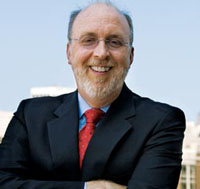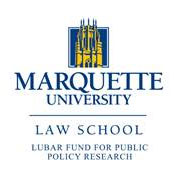Diederich College Appointment of John Pauly as Colnik Chair
 John Pauly came to Marquette University in 2006 to lead the Diederich College of Communication, and we were deans for two years together — or at least next door to one another, as he was in Johnston Hall and I immediately east in the “old building,” as we in the Law School now call Sensenbrenner Hall. Then Dean Pauly became Provost Pauly in 2008, and so for five years I reported to him, although that phrasing does not convey all the support that Provost Pauly gave to the Law School and to me as dean. Throughout these years and his administrative positions, I admired the way John remained engaged in his discipline — journalism — in a way also integrated with the larger work of the Marquette University faculty. I remain particularly drawn to his substantial essay, “Is Journalism Interested in Resolution, or Only in Conflict?,” published in the Marquette Law Review in 2009 as part of a dispute resolution symposium at the Law School (introduced here by conference organizer, Prof. Andrea K. Schneider). There are other examples of his contributions, including a post last month on our blog concerning the study of political polarization conducted by Craig Gilbert, Washington Bureau Chief of the Milwaukee Journal Sentinel and the Law School’s Lubar Fellow for Public Policy Research last year.
John Pauly came to Marquette University in 2006 to lead the Diederich College of Communication, and we were deans for two years together — or at least next door to one another, as he was in Johnston Hall and I immediately east in the “old building,” as we in the Law School now call Sensenbrenner Hall. Then Dean Pauly became Provost Pauly in 2008, and so for five years I reported to him, although that phrasing does not convey all the support that Provost Pauly gave to the Law School and to me as dean. Throughout these years and his administrative positions, I admired the way John remained engaged in his discipline — journalism — in a way also integrated with the larger work of the Marquette University faculty. I remain particularly drawn to his substantial essay, “Is Journalism Interested in Resolution, or Only in Conflict?,” published in the Marquette Law Review in 2009 as part of a dispute resolution symposium at the Law School (introduced here by conference organizer, Prof. Andrea K. Schneider). There are other examples of his contributions, including a post last month on our blog concerning the study of political polarization conducted by Craig Gilbert, Washington Bureau Chief of the Milwaukee Journal Sentinel and the Law School’s Lubar Fellow for Public Policy Research last year.
In any event, for all these reasons (and for any additional engagement with the Law School that it might occasion), I am delighted that my colleague Lori Bergen, dean of the Diederich College of Communication, has appointed John Pauly as the college’s Gretchen and Cyril Colnik Chair in Communication. In making the announcement, Dean Bergen noted that Prof. Pauly’s research and teaching “in the history and sociology of the mass media, cultural approaches to communication, media ethics and criticism, communication theory and the theory and practice of literary journalism have brought him international distinction as a scholar.” This appointment as Colnik Chair is a signal and well-deserved honor for a much-respected colleague and reflects not just terrific judgment concerning John Pauly’s past contributions to Marquette University and the community of scholars but also a prediction of more such. Kudos and congratulations to all involved.

 Five years ago Marquette Law School
Five years ago Marquette Law School 